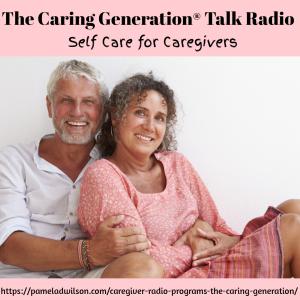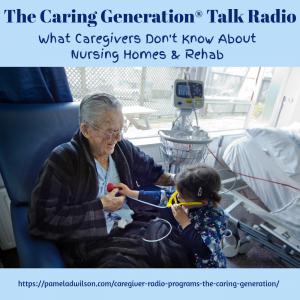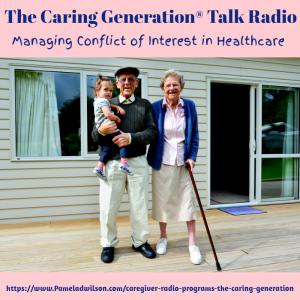Help for Caregivers: Caregiving Experts Share Wisdom About Medical Care and Nursing Home Care for the Elderly
Pamela D Wilson offers caregiver and patient education on The Caring Generation® radio show. Learn what caregivers should know by following this program.
GOLDEN, CO, USA, September 22, 2020 /EINPresswire.com/ -- Coordinating medical and nursing home care can be a daunting task for family caregivers. Trust in the healthcare system to do the right thing without realizing the responsibility of caregivers to advocate is a gap that can result in poor care for elderly parents. Wilson hosts The Caring Generation® Radio show each week to educate caregivers in all walks of life—family and professional on a wide range of caregiving topics.
Self-Care and Online Support Groups for Caregivers Plus Antibiotic Use In Nursing Homes for Older Adults with Dr. Christopher Crnich
Online caregiver support groups moderated by Wilson allow caregivers to discuss the pros and cons of caregiving, with many caregivers offering opinions based on their own experience. Joining with caregivers in online support groups helps view situations from different perspectives. Even when caregivers participate in online caregiver supports groups, concern exists about caregivers being perceived as selfish if they place their health needs before the needs of others. If the caregiver’s health fails—caregiving fails.
Caregivers can experience limited thinking because of burnout and an inability to participate in life like others without ongoing care responsibilities for an elderly parent. COVID-19 has changed family caregiving situations. In-home caregivers may be less available to help the elderly in their homes. Daycare programs may have been suspended and are slow to return to regular schedules.
Hesitance exists on the part of families wanting to place elderly family members in care communities because of lock-down concerns and worry about the ability to visit. Caregiver stress grows with time. Year one as a caregiver may be barely noticeable—many adult children don’t realize that they are a caregiver until years down the road. By year ten, caregiver stress is a different story.
Adding insight into the stress of caring for loved ones hospitalized or in nursing home care is Dr. Christopher Crnich, a faculty member in the Division of Infectious Disease within the Department of Medicine at the University of Wisconsin—Madison. Dr. Crnich is in a unique position of being the chief of medicine and the hospital epidemiologist at the William S Middleton Memorial Veterans Hospital and the assistant director of infection control at UW Health.
Crnich offers insights into the challenges of balancing anti-biotic use in the elderly with family concerns about treatment in complicated care situations. Listeners can learn steps to take to make sure that loved ones receive the care they need without causing additional health risks.
What Caregivers Don’t Know About Nursing Homes and Rehab With Dr. Lynn Flint
Wilson’s extensive experience in managing care for clients in nursing homes as a care navigator and medical decision-maker helps caregivers understand important factors about care for elderly parents. She shares ten tips for what caregivers don’t know about nursing homes and rehab to encourage family caregivers to advocate for the elderly in nursing homes. Care transitions between hospitals and nursing homes and nursing homes and homes are discussed as a potential area of caution.
While family caregivers may rely on the healthcare system to ensure a smooth transfer of information, this area is a gap where care can fall apart. Care transitions for older adults can be more challenging because the elderly may understand less about their medical conditions and the consequences of not following through with treatments. When family members are not proactive in coordinating care after a hospital or nursing home stay, there is a greater likelihood that the elderly parent will return to the hospital for a similar concern.
Dr. Lynn Flint joins Wilson to discuss her research article called “Rehabbed to Death.” Flint is an Associate Clinical Professor in the Division of Geriatrics at the University of California, San Francisco. She is a board-certified internist and hospital and palliative medicine physician, and a medical educator. In addition to her work at UCSF, she is an attending physician at the San Francisco VA Medical Center. There she provides inpatient palliative care consultation and nursing home care for older adults with complex chronic illness and functional and cognitive impairment.
Healthcare Conflict of Interest and Preventing Burnout Among Physicians With Dr. Sharmila Dissanaike
Healthcare consumers are vulnerable to conflict of interest experiences in the healthcare system. On this program, Wilson shares examples of how physicians and other healthcare providers may not realize how influence affects vulnerable older adults. With the consolidation of healthcare providers—hospitals or doctor offices may be in a partnership or ownership position of x-ray clinics or labs. These relationships should be disclosed to patients.
Tips to help consumers become aware of the potential conflict of interest situations in healthcare are offered. Family caregivers can gain confidence by asking questions specifically about conflict of interest situations. Having this information allows consumers to make more informed decisions about using a provider instead of feeling that choice is restricted.
Dr. Sharmila Dissanaike MD FACS FCCM is the Peter C Canizaro Chair of the Department of Surgery at Texas Tech University Health Sciences Center joins the program to talk about physician burnout and patient expectations of providers. Insights are offered into the reasons why individuals enter the medical field and the realities of working in the healthcare system that can result in burnout.
Dr. Dissanaike’s clinical and research interests focus on trauma, burns, critical care, and general emergency surgery. She is a Governor of the American College of Surgeons and a standing member of the Ethics committee. She also serves on the ACS Program Committee, the Advisory Council for Rural Surgery, and the editorial board of General Surgery News. She has received multiple awards for academic excellence, clinical performance, research, and teaching, and is a national leader in promoting better healthcare systems to prevent burnout among clinicians.
Information about The Caring Generation Radio Program and podcasts are available on Wilson’s website in addition to caregiving and elder care programs for the workplace, call Pamela D. Wilson at 303-810-1816 or email Inquiry_For_Pamela@PamelaDWilson.com
P Dombrowski-Wilson
Pamela D. Wilson, Inc.
+1 303-810-1816
email us here
Visit us on social media:
Facebook
Twitter
LinkedIn
Why Hospitals Don't Want the Elderly
Legal Disclaimer:
EIN Presswire provides this news content "as is" without warranty of any kind. We do not accept any responsibility or liability for the accuracy, content, images, videos, licenses, completeness, legality, or reliability of the information contained in this article. If you have any complaints or copyright issues related to this article, kindly contact the author above.



